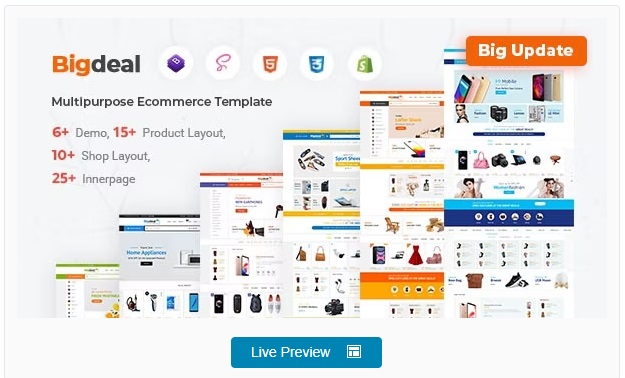To design a good ecommerce website template, a developer needs to possess a diverse set of skills that combine technical expertise and creativity. Here are some essential skills for a developer to create an effective and attractive ecommerce template:

Front-End Development:
Strong proficiency in front-end technologies such as HTML, CSS, and JavaScript is fundamental. A developer should be able to create visually appealing and responsive layouts that work seamlessly across various devices.
User Experience (UX) Design:
Understanding user behavior and designing intuitive user interfaces is crucial. The developer should focus on creating a positive user experience by optimizing navigation, ensuring smooth interactions, and reducing friction in the buying process.
Responsive Web Design:
The ability to create a ecommerce HTML template that adapts and looks great on different screen sizes and devices is essential. Mobile-friendliness is no longer an option but a necessity for ecommerce websites.
Graphic Design:
Having graphic design skills allows the developer to create eye-catching visuals, including logos, banners, product images, and icons that contribute to the overall aesthetics of the website.
Web Performance Optimization:
Knowledge of techniques to optimize website performance, such as image compression, code minification, and caching, is crucial to ensure fast loading times and a smooth user experience.
Ecommerce Platform Familiarity:
Familiarity with popular ecommerce platforms like WooCommerce, Shopify, Magento, or BigCommerce is essential. This helps in integrating the template seamlessly with the chosen platform and utilizing its features effectively.
Search Engine Optimization (SEO):
Understanding the basics of SEO and incorporating SEO-friendly elements into the template, such as meta tags, structured data, and URL structure, helps improve the website's visibility on search engines.
Version Control:
Proficiency in version control systems like Git enables efficient collaboration with other developers and helps in managing code changes effectively.
Cross-Browser Compatibility:
Ensuring that the template works consistently across different web browsers is crucial to providing a consistent experience to all users.
Security Best Practices:
Knowledge of security best practices is essential to safeguard customer data, prevent security breaches, and implement measures like SSL encryption.
Testing and Debugging:
The ability to test and debug the template thoroughly is vital to identify and fix any issues or bugs before the website goes live.
Communication and Collaboration:
Effective communication and teamwork are essential, especially when working in a team with designers, marketers, and other stakeholders.
Continuous Learning:
Staying updated with the latest web development trends, tools, and technologies is crucial for a developer to provide modern and cutting-edge ecommerce templates.
By combining these skills, a developer can create a compelling and high-performing ecommerce bootstrap template that meets the needs of both the business owner and the end-users, leading to a successful online store.





Comments